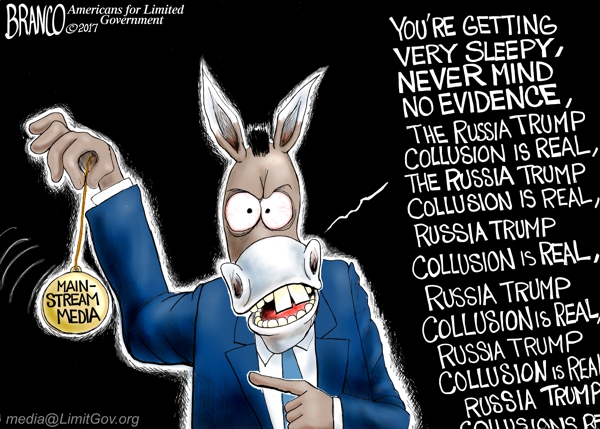It was not the Democratic National Committee and Hillary Clinton campaign funded Fusion GPS-Christopher Steele junk dossier in 2016 that caused the FBI investigation of the Trump campaign, but George Papadopoulos’ meetings with suppose Russian agents to obtain “dirt” on Hillary Clinton.
That is the narrative now being fed by the mainstream media. According to the New York Times’ “bombshell” report published on Dec. 30, 2017, “when leaked Democratic emails began appearing online, Australian officials passed the information about Mr. Papadopoulos to their American counterparts, according to four current and former American and foreign officials with direct knowledge of the Australians’ role.”
So, let’s take a look at the timeline.
The Democratic National Committee emails began appearing on Wikileaks on July 22, 2016.
Part of the Steele dossier named former Trump campaign advisor Carter Page as one of the top Russian colluders on July 19, 2016.
Page had appeared on Youtube published July 7, 2016, speaking at the New Economic School’s commencement ceremony in Moscow, which appeared to form part of the basis for Steele’s assertion.
So, by the time Australia tipped off the U.S. about Papadopoulos, Steele had already fingered Page in his own investigation on Trump-Russia collusion.
Later, after Wikileaks published on July 22, 2016, Steele alleged then-Trump campaign manager Paul Manafort was at the heart of the conspiracy to work with Russia to put the emails onto Wikileaks, with Page as the intermediary. According to the dossier, “a well-developed conspiracy of co-operation between them and the Russian leadership. This was managed on the Trump side by the Republican candidate’s campaign manager, Paul Manafort, who was using foreign policy advisor, Carter Page, and others as intermediaries.”
Steele defined the conspiracy explicitly: “the Russian regime had been behind the recent leak of embarrassing e-mail messages, emanating from the Democratic National Committee (DNC), to the WikiLeaks platform. The reason for using WikiLeaks was ‘plausible deniability’ and the operation had been conducted with the full knowledge and support of Trump and senior members of his campaign team. In return the Trump team had agreed to sideline Russian intervention in Ukraine as a campaign issue…”
Eventually, at some point, a FISA court warrant was taken out on Page, perhaps based on the dossier.
What is controversial is not whether Australia tipped off the U.S. about Papadopoulos before or after the Page warrant was ordered. It is whether Page’s civil rights were violated and a national security investigation via the Foreign Intelligence Surveillance Act Court was ordered into the Trump campaign using a Democrat-funded political hit piece. Why?
Because according to the law, to get a warrant on Page, there needed to be probable cause that he specifically was acting as a foreign agent. Besides the Steele dossier, what evidence has been presented that he was acting as an agent? Was that the basis for the FISA court warrant?
What if it was inaccurate, and Manafort and Page were never coordinating with Russia on helping the DNC emails appearing on Wikileaks at all?
Then what you have are not only Steele’s sources being in question, if they even existed. But, Papadopoulos or no, you have the Democrats paying a British former spy to produce an intelligence dossier to pin their own troubles, that is, embarrassing emails being published in the news, on Trump in an outlandish foreign conspiracy theory.
Next, the Obama administration used that allegation to justify a full-scale counterintelligence investigation into the opposition party in an election year, which is now leading to prosecutions for anyone unfortunate enough to have been questioned by the FBI without having an attorney present.
It should not be overlooked that once campaign officials like Page or Manafort had FISA warrants into them, all their contacts with the campaign would have been subjected to surveillance as well.
Nothing in the Special Counsel Robert Mueller’s guilty plea deal with Papadopoulos for lying to investigators will make any of that any better. Again, FISA court warrants are only supposed to be issued on individuals for probable cause that that individual specifically is acting as a foreign agent.
So even if Papadopoulos had communicated with Russian or other foreign contacts, that generally could not have been used to secure a warrant against Page for the same, unless those contacts had actually implicated Page like the dossier did.
Therefore, the New York Times’ “bombshell” appears to be more designed to deflect attention away from the egregious violation of rights and abuse of the nation’s intelligence powers that using the Democrat-funded dossier on Page and others would entail, than it suggests that Papadopoulos’ foreign contacts somehow justified how the rest of the investigation was carried out.
There are other troubling questions. For starters, Papadopoulos was not questioned by the FBI until 2017, after the election had occurred. Was there a warrant to investigate his emails, which formed the basis for the guilty plea that he lied to investigators? If so, when was it obtained? When was Page’s warrant obtained?
Finally, was the Democrat-funded dossier, or information from the dossier, used to obtain FISA court warrants against Trump campaign and then transition officials?
Papadopoulos’ limited involvement in this whole affair does not begin to justify the breadth of the investigation that was undertaken by the Obama administration into the Trump campaign. They needed more. And the Steele dossier might have been just the thing that did the trick.
Robert Romano is the Vice President of Public Policy at Americans for Limited Government.







